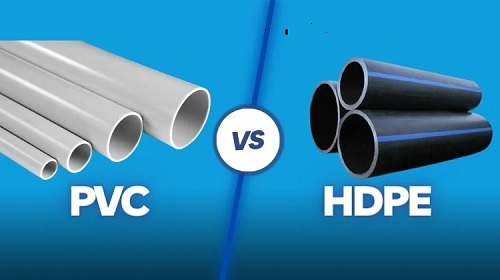With the excessive use of plastic pipes in the world, multiple types of plastic materials are being used in the manufacturing of pipes. Many companies like Nepro Pipes, Adamjee Pipes, and Master Pipes are using various materials to offer extraordinary experiences to their customers.
It has become common to compare those materials and make sure which one is better and why. The two most common materials that are compared are PVC and HDPE plastic. Mostly, people prefer to compare these materials and learn what is the difference between PVC and HDPE pipe.
If you are one of those people, you have come to the right page. In this blog, we will share a complete guide on the differences between these plastic materials.
Quick Comparison – PVC Vs HDPE
Let us first quickly compare these materials before having a deep knowledge of the differences. On a lighter note, PVC and HDPE pipes are used in the pipelines of various materials and properties. Ranging from waterlines to drainage systems, you will find these materials being used in the pipelines.

Being types of plastic, they have similar physical properties like the shape of pipes, sizes, and structure. Due to this, it might be hard for you to notice the difference between these plastic types when used in the manufacturing of pipes.
However, you can find a huge difference when you dig deeper into their comparison for learning the chemical properties.
Find Out: Best Drainage companies in Brisbane
Difference Between PVC and HDPE pipes
Now, you have read quickly about PVC and HDPE plastic materials. It is time to learn more about their differences and estimate which type is better regarding specific properties.
Flexibility
In terms of flexibility, HDPE pipes are far better than PVC pipes. These pipes are extremely flexible which means they will not get broken when you bend them to a suitable level. On the other side, PVC pipes can’t bend like those pipes as they have less flexibility.
If you put extra force on PVC pipes, they will get broken or have scratches that make them useless without repair.
Pressure Bearing
As both are types of plastic, many people think that PVC and HDPE pipes will have the same pressure limits. However, PVC pipes are not as good when it comes to bearing pressure beyond the base pressure limit. You will see that these pipes will be broken after reaching a little higher than that limit.
On the other hand, HDPE pipes can bear a higher level of pressure and will never change the shape. Additionally, these pipes will be over 2000 times resistant to water hammer when installed in the water pipelines.
UV Resistance
As plastic pipes are normally installed in pipelines, they are exposed to UV radiation. It is important to compare both plastic types on this factor and estimate which one is better. In our research, we have found that HDPE pipes are good to go when it comes to UV radiation.
The reason is these pipes will not impact the water properties due to these radiations. However, PVC pipes can be damaged from these radiations and can be broken after a few months if they are exposed to these radiations over a long time.
Temperature Limit
In terms of temperature, HDPE pipes have a higher temperature range in which they can work smoothly as compared to PVC pipes. You can install these pipes with a temperature range of -40 Fahrenheit to 140 Fahrenheit.
It means that the fluid flowing inside these pipes or the surrounding environment can have any temperature from this range. This is the reason why HDPE pipes are preferred to be installed in factories as compared to PVC pipes.
Durability
When it comes to durability and lifeline, PVC and HDPE pipes are found similar as they both have a lifespan of around 50 years. In general, they can have a lifeline of 50 years which means that you can use them for this period.
However, this durability can vary depending on the factors in which you have installed them or the nature of fluid flowing through these pipes.
Usage
PVC and HDPE pipes are mainly used in the pipelines. However, the fluid flowing through those pipelines can be different. For example, PVC pipes are mostly used in municipal waterlines and related ones. On the other side, HDPE pipes are normally used for gas pipelines and drinking water systems.
The reason for this usage is extra temperature range as well as resistance towards factors like UV radiations.
Final Summary
By reading this blog, you must have got an answer to the question what is the difference between PVC and HDPE pipe? We have discussed this comparison by discussing various factors to make it more clear for you.
Now, we hope you have got an idea of which type of plastic pipes are suitable for your place.
